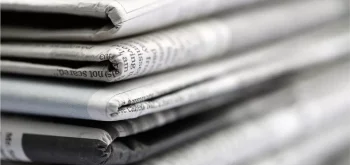A new study drawing on interviews with 22 specialist journalists reveals that courts are being covered ‘less often and by fewer journalists’ and highlights the risk to open justice by declining coverage. According to the new report’s author Richard Jones of the University of Huddersfield, court reporters ‘typically have the press bench to themselves’ if cases are covered at all.
The new research is published in the journal Journalism Practice and makes the case for a subsidy to help struggling local newspapers maintain their reporting of local courts. Jones argues that despite the financial ‘crisis’ in the industry, court reporting does remain ‘a relative priority’.
The new study quotes the Justice Gap’s own 2017 research by Brian Thornton into the decline of court reporting which found that local newspapers were increasingly relying on agency copy to cover the courts which featured in the second issue of Proof magazine. Jones reported that there ‘remains a commitment’ within the local press to cover the courts beat ‘wherever possible’ and ‘a sense among those journalists who do so that they are performing an essential service’. ‘They still relish doing what one described as “the best job on the paper”,’ he wrote.
Richard Jones is critical of the 2019 Cairncross review into the challenges faced by journalism for having paid ‘almost no attention’ to court reporting which, he argues, was ‘a surprising omission’ given the ‘centrality of covering institutions such as the courts’. Jones makes the case for ‘some form of subsidy for court coverage’ possibly under the BBC’s Local Democracy Reporter Service. ‘This research reveals that, while undoubtedly interested in providing entertaining slices of local life that have a commercial value to their publishers, court reporters are also committed to telling important local stories while also scrutinising the activities of those with power, including police, prosecutors, magistrates and judges,’ it says.
‘Responses from interviewees on the courts beat indicate that courts are being covered less often and by fewer journalists, with newspaper reporters typically having the press bench to themselves. Yet there remains a commitment within the UK’s local press to cover the courts beat wherever possible, and a sense among those journalists who do so that they are performing an essential service. They still relish doing what one described as “the best job on the paper”.’
Richard Jones, University of Huddersfield
The interviews explore the role of court reporting in maintaining the principle of open justice as ‘a key justification used by court reporters in defence of their work’. ‘What’s the point in having someone sent away for 20 years, if no-one knows it’s happened? There’s actually no point whatsoever,’ one agency reporter told the study.
According to the journalists interviewed, courts without a regular press presence ‘tend to forget that there’s a principle of open justice’ and ‘practices start to creep in which are not conducive to open justice’. For example, courts not allowing journalists into courtrooms reckoned to be ‘more prevalent’ at smaller magistrates. Jones write: ‘This suggests that the less often journalists attend a court, the less open the practices of that court become, further underlining the importance of court attendance as a way of upholding the normative values of local journalism.’
The research noted that some courts had closed down press rooms and reporters were having to sit in the public gallery as the press bench was no longer being available. One journalist said: ‘In some of them the press room has been converted to something else, in some of them it’s been locked and it’s got a code on the door that no-one knows, you can’t get in.’ Journalists reported having to sit next to relatives of those involved in court proceedings ‘despite official guidance urging courts to always reserve a press bench and to provide a press room where possible’.
Despite the frustrations, reporters seemed positive about the job. ‘I don’t think there is much I would change. It’s the best job on the paper. I’d never tell the boss, but it’s brilliant.’







Freedom of the Press